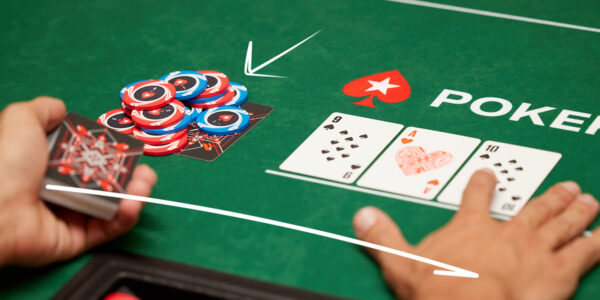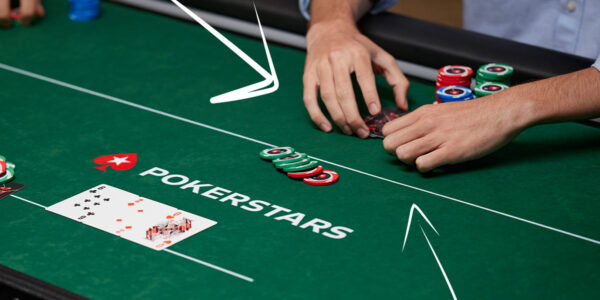Applying and Avoiding Pressure When Deep
The best way to explain how stack depth affects the amount of pressure your range wants to apply or avoid is by looking at two very different board textures.
Hand 1 – Applying Pressure
In this 100NL Zoom hand, I am in the SB with K♥ Q♥ and UTG opens to $2.50. I 3-Bet to $11.00 and he makes the call. The starting stacks are around $160. We are significantly deeper than normal.
The flop comes 9♣ 7♥ 2♥ and he checks. I will build a polarised betting range on this board. The main thing that being deep does in theory is it pushes my range more towards using smaller bet-sizes. This is because my opponent has more 77 than me and possibly some 22. His sets perform a bit better 160 big blinds deep and my overpairs perform a little worse. That said, this is not such a horrible board that it is wrong to big bet with KK and the like. I decide that checking, betting 33% pot, and betting 70% pot are all viable lines but I opt for the latter for one simple reason.


People overfold by the river in 3-Bet pots when stacks are deeper.
When you are faced with a choice between a few equally reasonable options, try to think ahead. On which branches of the game tree is your average opponent most likely to misplay their range and how? In this case I expect Villain to fold too much of his range by the river. If the board runs out blankly for example, then he will have to call down with almost all JJ and some weaker hands like AK and TT from time to time to make my bluffs 0 EV. Since most players are going to shy away from brash calls with AK, I can gain EV by just favouring the flop options that leads to me putting all of the money in.
Technically my hands does not make a great third barrel on a blank run-out because it blocks Villain’s busted draws, and thus, his folding range; but blockers hardly matter when the pool is playing so far away from game theory and folding as much as they are.
Villain folds here and I take down the pot but I’m happy with the plan to blast off.
Deep stack play require a willingness play with the extra 60 big blinds as fearlessly as you’d play with the first 100, but the average reg in this pool does not get close to an optimal defence frequency against multi-street aggression. He might get away with this against timid players who do not bluff much, but our mission is to be the player who punishes him for this overfolding.
Hand 2 – Avoiding Pressure
In the last hand, the threat of our opponent running into our nutted hands was enhanced by the deeper stacks, we were able to apply pressure to increase our EV and fold equity due to his propensity to fold too much of his range. In the same way, when stacks are deep and when the board is bad for our range as the 3-bettor, we will need to take measures to avoid situations where we are playing gigantic pots with overpairs or top pair. This will involve checking a lot of our range on unfavourable boards as the 3-bettor; particularly flops which give Villain many hands that destroy our overpairs.
A good example of one of these flops is 8♣ 7♦ 6♣ . If this had been the flop in the previous hand, our range would have been in a lot more trouble. On a flop like this at this stack depth the EV of the caller’s range is much higher than that of the SB 3-bettor’s range. What do you do in game theory when your range has terrible EV? You check. This comes naturally to us when we’re the BB caller of an UTG raise, but people struggle more to find these checks when they raised the previous street. Being deep on this flop is worse than being a big blind caller against an UTG range so we should start by checking.
If we bet here with a hand like QQ as the SB 3-bettor, we are in a terrible situation when we get raised. The pot is growing to the extent that the full 160 BBs are coming into play and this is the opposite of what you want with this hand class.
Our range has a nut disadvantage here. This is the fatal ingredient to doing a lot of betting. When stacks get deeper, the nuts become more meaningful and so the nut disadvantage becomes a greater evil. This is what makes the EV of our range so low.
Summary
- When the board is favourable for your range and stacks are deeper, your nut advantage and EV increase.
- With deep stacks, try to apply more pressure than normal in advantageous situations for your range.
- When the board is unfavourable for your range and stacks are deeper, your nut advantage and EV decrease.
- With deep stacks try to control the pot size more than normal in disadvantageous situations for your range.














